By Pankaj Sachdeva
In Hansal Mehta’s Simran, there is a beautiful character Sameer (Sohum Shah), who, at one stage, says, “Mujhe lagta hai ki kabhi insaan ko puri tarah se samjha nahi ka sakta. Kyunki badalte rehna hi insaan ki fitrat hai. Change is the only constant.” One can never completely know a person because it is human nature to change. Jasmeet K. Reen’s Darlings believes in the other side that some people can never change as it is in their fitrat to behave in the same way all their life. Set in the lanes of Byculla, Darlings tells the story of Badru (Alia Bhatt), who faces domestic violence from her husband Hamza (Vijay Varma). Badru’s mother Shamshu (Shefali Shah) lives in the same chawl and advises her daughter to leave Hamza, but the gullible Badru keeps hoping that she can bring a change in him.

Darlings takes its premise from the animal fable The Scorpion and the Frog, which teaches that ‘vicious people cannot resist hurting others even when it is not in their own interests.’ The fable is about a scorpion who asks for help from a frog to cross the river. The frog agrees, but the spider still stings the frog as it is his nature to do it. In Darlings, Hamza is the scorpion, and Badru is the frog. Hamza is addicted to alcohol. He regularly beats Badru at night. The following day, he behaves like he is the most loving husband in the world. He thinks Badru takes his abuse as she loves him. It is as if he cannot help beating her. He even asks God to take the demon out of him. Badru tries every trick to reform him while accepting violence. Ultimately, she realizes that Hamza, like the scorpion, will never change. Kuch mard bicchoo hote hain, kabhi nahi badlenge. Therefore, she decides to leave him.


What also interesting was that not only Hamza was incorrigible, but Badru also did not seem to change easily. Like the frog, she always acquiesced to his demands. She believed whatever Hamza told her. Even when she has tied Hamza up, she starts to be convinced by his sweet talk. If Hamza was incapable of change, Badru could also not easily become a hardened soul. She tried to become the scorpion by paying him back the same way, but it was in her fitrat to be the frog. Darlings, thus, shows that some people can never really change.

To get rid of Hamza from their lives, Badru and Shamshu hatch a plan to kill him. They tie him onto the railway tracks. However, some epiphany hits Badru. She sees herself sitting in front of a mirror and putting on a necklace. But then she starts to see some scars on her face. She tries to rub them off but cannot. Badru figures out that if she kills Hamza, he will keep returning to her memories all her life. She will never be free of him. Badru had told her mother that Hamza used to cause her physical injuries earlier, but he has even started to cause mental injuries. Darlings ends on a similar note. The scars in the mirror were not the physical scars that can still heal but the emotional scars that could run deeper than the Nile. Badru does not want to deal with those. She did want to become the scorpion as her nature was to be the frog. Therefore, she releases Hamza and lets karma punish him.


Earlier this year, Suresh Triveni’s Jalsa also talked about power and revenge. Ruksana (Shefali Shah) discovers the truth that it was her employer Maya (Vidya Balan), who hit her daughter and drove away. She decides to take revenge by paying back her similarly. She takes Maya’s son Ayush to the beach as if planning to drown him. She, however, does not take the final step. Because an eye for an eye makes the whole world blind. She could have left Ayush to drown, but she did not. Thus, she comes out as a bigger person in the end.


Shamshu also tells Badru that she did the right thing in letting go of Hamza; otherwise, he would keep coming back to haunt her. It is then revealed that Shamshu, too, had killed her abusive husband and took the help of the neighborhood butcher Kasim (Rajesh Sharma) to dispose of his body. I could not help but think of Shakun Batra’s Gehraiyaan, which also talked about the circle of life and how the things that happened to our parents also happen to us in our lives. It is like we are in a loop, Al. Like Shamshu, Badru was facing the same circle of violence at the hands of her husband. Shamshu keeps telling her to leave Hamza or kill him because she knows Hamza is like her husband. Many a time, Badru tells her mother that it is her life and her story is different. She adds that Hamza, unlike her father, loves her back. But, as it happened in Gehraiyaan, it becomes clear that Badru and Shamshu’s stories follow a similar trajectory. Alif Be Te is not just a poem for the kids but also a reminder of Badru and Shamshu’s shared past. Badru breaks out of the past by letting go of Hamza.
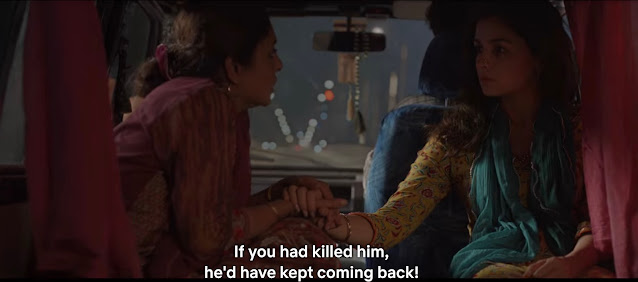
Early in the film, when Hamza is released from jail, he is suspicious that Shamshu is the one who complained against him. He even hits her on the nose, bleeding her in the process. Shamshu does not retaliate. She comes home and washes her face. Hamza’s hitting, perhaps, reminded her of her husband. The camera pans to his photograph, setting the stage for the impending revelation in the end.
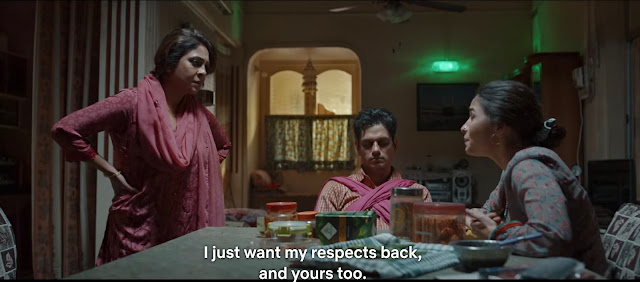
Darlings is full of tiny details. When Hamza met Badru when they were dating, he gave her a teddy bear that says, “Kaha na sorry.” It is a perfect allegory of their relationship. Acting cute and trying to apologize. The apartment where Badru and Hamza live has the number 302, the same as the section for murder in the Indian Penal Code. At one point, Badru goes to the neighborhood pharmacy, and the shopkeeper instinctively pulls out an antiseptic solution for her wounds. When Badru refuses that she does not need it, he gives her sanitary pads. Badru is also shown to be superstitious. She avoids stepping on the nimboo-mirchi. She throws salt on her body. She believes that bird droppings bring good luck and that taking money from the left hand brings bad luck. She does not let Hamza play with the empty jhoola. However, after her miscarriage, she sees a black cat when she leaves the hospital. But, at that point, she does not wait to clear the path or anything. She simply walks away on the way as if something in her has changed.

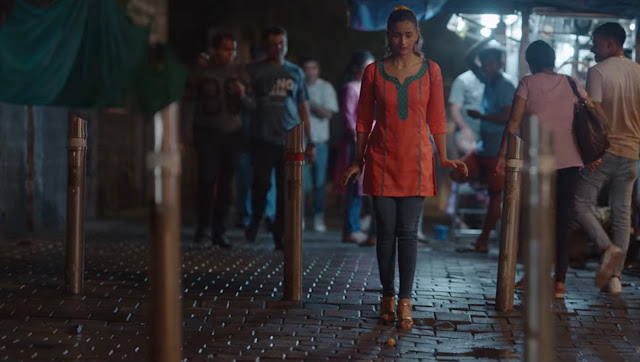


Darlings boasts of worthy performances by an ensemble cast. Vijay Verma is terrific as Hamza and reminded me a bit of Nana Patekar’s character in Partho Ghosh’s Agni Sakshi. Alia Bhatt, who has also produced the film, is again superb (though in some scenes, her voice seems to shriek a bit). Her best moment in the film is when she breaks plates in anger; however, this anger turns to dread when she thinks Hamza has returned. Shefali Shah is delightful, and her eyes play the role of the best supporting actor in the film. Other cast members are also excellent.

The film uses sound to add a layer of fear. Early in the film, Hamza finds a stone in the food while chewing. There is a cracking sound, and everything goes quiet. Moments later, he finds another one. The terror on Badru’s face becomes palpable as she realizes the trigger has been pulled. At another point, Hamza returns from the office while his lunchbox makes eerie sounds about the impending horror to be faced by Badru. There are many other moments such as these.

Darlings uses humor to lighten up the proceedings. The beauty parlor lady and her clients below Badru’s house provide a comical commentary on the dark events happening up the stairs. Dialogues, such as Bapu in jail, are amusing. Songs, such as Pleaj!, also have funny lines like, “Darte darte hum to dry fruit ho gaye, piste piste hum pista ho gaye.” Some moments surprised me, such as when Zulfi’s (Roshan Mathew) affection for Shamshu was revealed. To be fair, earlier in the film, there was a scene when he created a video for Shamshu that hinted at the same. Zulfi was quite a fun character. He gets easily manipulated by everyone. He is an aspiring writer. He tells Hamza that he is writing a horror comedy, maybe like Darlings itself.

Darlings leaves a few plot questions unanswered. For instance, after Badru falls from the stairs, she appears to lose consciousness. It is not clear how she reaches the hospital all by herself. When Hamza is captured, he does not scream. Given the close proximity of the chawl, it was unfathomable how he did not make a fuss. It loses pace in the second half until it reaches the climax, which redeems it. Also, in this era of streaming, the brand placements in the film feel outdated, but hey, I am not producing the film.

Darlings has been co-written by Pareveez Sheikh, who also wrote Vikas Bahl’s Queen. Queen depicts the story of Rani (Kangana Ranaut), who goes on her honeymoon all by herself after she is ditched at the altar by her fiancé Vijay (Rajkummar Rao). Rani realizes that she does not need any Vijay to make her happy. She is complete on her own. There is an element of Queen in Darlings as well. The film opens with Badru waiting for Hamza outside a movie theater. He turns up late. The ice cream melts. She misses the movie. Later, he mocks her that she won’t be able to live without him as she has not been able to even go to the movie theater all by herself. The film ends with Badru driving to the theater on her yellow scooter. She decides to go watch a film all by herself. The extra S in Darlings is, perhaps, her own self. And, as the song in also Queen goes, “Agar maajhi saare saath mein, gair ho bhi jaayein, toh khud hi to patwaar ban, paar honge hum. Auron se kya khud hi se, poochh lenge raahein. Khud hi to hain hum kinare.” Even if everyone turns against us, we will become oars ourselves and cross the sea on our own.

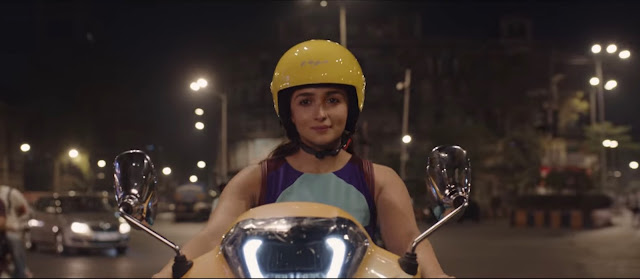
Trivia:
1. Darlings uses films produced under the Red Chillies banner interestingly. The film shows a movie theater playing Badla and ends with the theater playing Zero, which was, in reality, released before Badla. Songs from Om Shanti Om are also referred to in the film.

2. Kaun Banega Crorepati in Darlings.

3. Luck in Gehraiyaan and Darlings.

5. Darlings mentions a lot more films in its credits. It seems a few scenes have been cut, as I did not see these in the film.

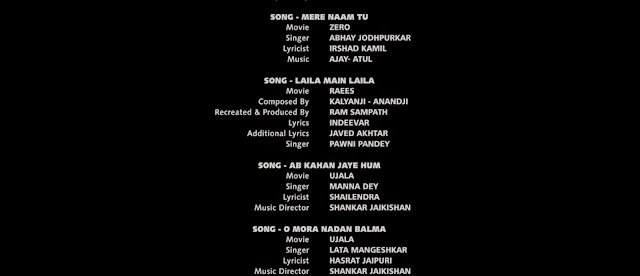

Dialogue of the Day:
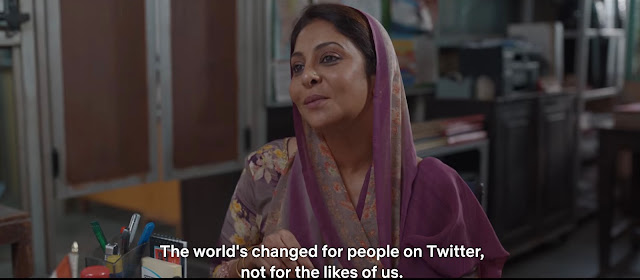

[Read more of the author’s work on his blog here]

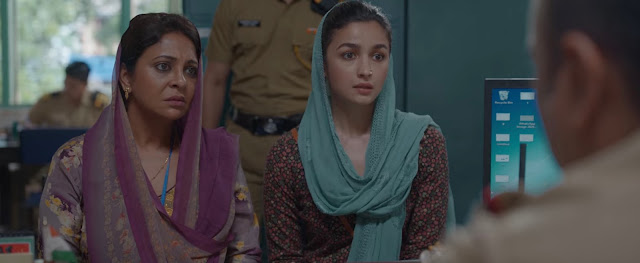






Leave A Comment
You must be logged in to post a comment.